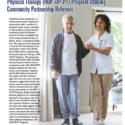
The purpose of this study was to describe the development and initial pilot results of the HOP-UP-PT Program, a hybrid physical therapy care model (in-person and telerehabilitation visits). The prospective observational pilot study included five participants referred from a community center. The HOP-UP-PT Program utilized fall risk, functional, environmental, cognitive, and health-related assessments. Five older…
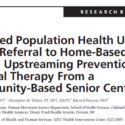
The purpose of this study was to describe outcomes of the HOP-UP-PT program, including telerehabilitation visits and activity monitoring use, targeted toward older adults referred from one community senior center. Older adults identified as “at risk” for decline or becoming homebound were referred by Auburn Hills senior center staff to participate in the 6-month program…

The growing healthcare demands of an aging population have created an urgent need to develop and evaluate novel preventative healthcare models capable of facilitating positive health outcomes any reduced cost thereby bringing about increased healthcare value to the community.
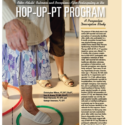
The purpose of this study was to describe self-reported outcomes and perceptions of community-dwelling older adults who participated in HOP-UP-PT. A telephone survey was offered 1-3 months after program completion to HOP-UP-PT participants. No falls were reported by 15 respondents and 3 reported 1 to 2 falls without injury. Seventeen participants reported no hospitalizations, one…
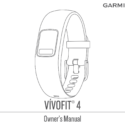
Many adults over 65 years report they do not meet the recommended physical activity guidelines of 150-300 minutes of moderate physical activity per week. Activity trackers promote self-efficacy and physical activity in an older adult. Therefore, activity trackers can be useful to monitor activity and safely guide increasing exercise amounts. The HOP-UP-PT base independence program…
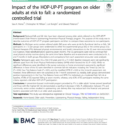
HOP-UP-PT is excited to share an open access publication which provides strong evidence for the programs impact on reducing falls and fall risk. Notably, the study identified that those with the highest fall risk when beginning the HOP-UP-PT program had an 8-fold decrease in falls compared to older adults who continued with normal activity. The…
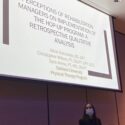
Two research studies about HOP-UP-PT were featured at the Michigan state conference for physical therapists and was recognized with a state-level research award. This provides further evidence of the effectiveness of the HOP-UP approach for empowering older adults’ freedom and independence.
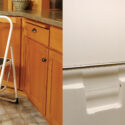
Reducing falls and fall risk is best accomplished when it addresses multiple risk factors. The home environment is one critical area to consider as there are often overlooked hazards that are easy to fix. Older adults and their families should consider using The Home Fall Prevention Checklist for Older Adults. Healthcare providers may find the…

Hello, and welcome to a video aimed at teaching you safe steps to get up after a fall. You may already know that one in four adults over the age of 65 fall each year. This rate increases as a person ages. Additionally, lying on the floor for an extended time after a fall may…
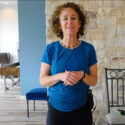
Join Dr. Tiffany Shubert, Physical Therapist and expert in aging, health, and wellness in video one of this multi-part falls prevention exercise program.
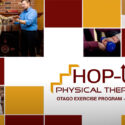
Welcome to the Hop up PT interactive exercise video to guide you in the Otago Exercise Program. This program was designed to help you maintain your strength and mobility and to help prevent falls.

A core component of the Foundational HOP-UP-PT Independence Program is the application of the CDC’s Stopping Elderly Accidents, Deaths, and Injuries program. A highly regarded program available to the public and healthcare providers, STEADI helps identify and treat falls and fall related injuries.

The Stay Independent brochure, available as a component of the Center for Disease Control and Prevention STEADI programming, contains a Fall risk Screening questionnaire that is useful to older adults and their families, community centers, and health care providers. The 12-question screening tool is a validated fall risk self-assessment tool (Rubenstein et al. J Safety Res;…

Welcome to the HOP-UP-PT interactive exercise video to guide you in the Otago exercise program. This program was designed to help you maintain your strength and mobility and to help prevent falls. This video is intended for participants who have viewed the complete demonstration video and are ready to complete the program, start to finish…
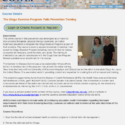
The Carolina Geriatric Workforce Enhancement Program (CGWEP) website provides information on the Otago Exercise Program and how to become an Otago Exercise Program Provider. Resources on administering the program with participants are also available.

An upstream approach to healthcare aims to examine and then impact the root causes of a health-related problem rather the symptoms. The approach can bring about downstream improvements in health outcomes and decrease healthcare costs. HOP-UP-PT uses this approach as the foundation of all evaluations, interventions, and programming.
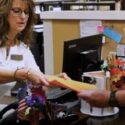
Community centers and an older adult’s social network are the key to identifying which older adults might be at risk for falls or becoming homebound. As of 2022, HOP-UP-PT is now providing community center staff, employees, and volunteers the opportunity to become a Certified HOP-UP-PT Ambassador. There is no cost to becoming a certified ambassador.…
Technology can be a great help in tracking and improving your health. One of the challenges is that using technology often takes some experience or some guidance. One of the components of the HOP-UP-PT Foundational Independence program is the use of an activity monitor that a person wears on their wrist. Below are some key…

The Timed Up and Go (TUG) test is frequently used to determine the ability to be safe with activity and fall risk. A therapist times how long it takes an individual to stand up from a chair, walk a short distance (10 feet), turn around, walk back to the chair, and sit down. This test…

This study examined billing, reimbursement, and administrative outcomes of the HOP-UP-PT (Home-based Older Persons Upstreaming Prevention-Physical Therapy) program. This pilot study involved 6 participants and 4 different insurances. Key findings include, but are not limited to: Article Abstract: Wilson CM, Arena SK, Calleja K, et al. (August 20, 2024) Administrative Analysis of the Home-Based Older…

